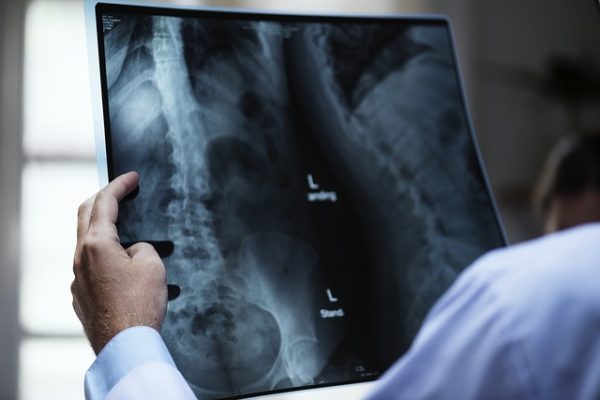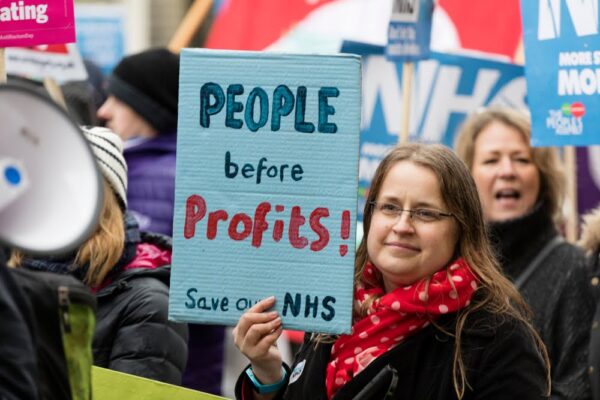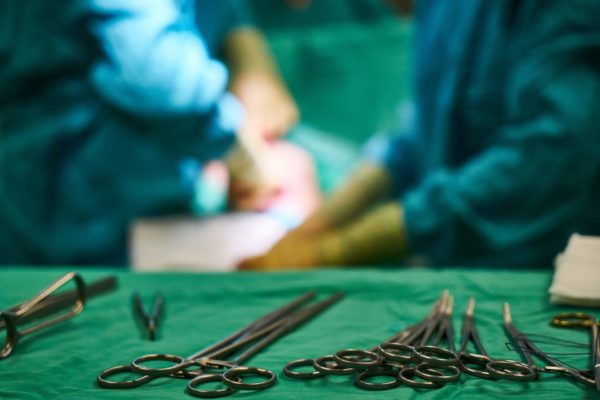
One quirk of the NHS at its inception in 1948, was that GPs remained independent contractors working under contract to the NHS. Today GPs are either partners in what is effectively a very small business or salaried and employed by primary care companies. Where GPs have always stood out as different from a private company, however, is that their prime focus is on their patients, not on increasing profits and paying shareholders.
The introduction of a new type of contract, the APMS (alternative provider of medical services), in 2003/2004 triggered the entry of a different type of GP business, one with much more in common with a private for-profit company. These GP companies sought to run chains of surgeries where GPs were employed on salaries (rather than as partners). These companies have profits to make and are therefore not solely focused on patient care. Now all new contracts are advertised as APMS. More recently, the primary care market has seen the entry of yet another new type of business - digital GP services. The long-term underfunding of the GP sector in recent years has, however, made this sector of the NHS less appealing for private companies. GP partners and companies holding NHS contracts are now struggling to survive.
Privatisation
There were two major changes that opened up primary care to privatisation; allowing GPs to opt out of providing out-of-hours care and the introduction of APMS contracts.
The opt-out
If GPs opted out of providing out-of-hours care to their patients, commissioners sought provision elsewhere and there were a number of private companies that gained substantial contracts around the country to provide phone advice and home visits. In other areas, consortia of local GPs were awarded the contracts. In both cases, the changes allowed profit driven entities to gain a foothold in the primary care market. For further details of the privatisation of emergency care (Out-of-hours, NHS 111) see our overview.
The APMS contract
The introduction of the Alternative Provider of Medical Services (APMS) contract in 2004 ushered in the possibility of GP services being run by private companies rather than GP partnerships. It opened the doors to companies such as Assura (which became Virgin Care, now HCRG Care), Care UK (now Practice Plus Group) and The Practice Group (now HCRG Care) to take on chains of surgeries. The Equitable Access to Primary Care Services programme that followed which required each primary care trust (PCT) to open a new GP-led health centre open seven days a week acted as a further boost to new entrants to GP services.
Then the passing of the Health and Social Care Act (2012) boosted opportunities still further for non-NHS organisations to run primary care. Not only that, but existing GPs holding GMS (general medical services) or PMS (primary medical services) contracts could also bid for and win additional APMS contracts, and it therefore opened the way for GPs to expand from a small business to a much larger business run along the lines of a company with shareholders.
These two changes plus the policy of the Labour Government for a network of walk-in centres run under APMS contracts around England led to the success of a number of companies started by GPs, such as IntraHealth and SSP Health.
The development of The Practice Group (TPG, now HCRG Care) is an example of how a private company spread through primary care taking advantage of APMS contracts. Started by GPs working for the NHS, from 2005 onwards TPG offered to take over the running of the infrastructure of existing GP practices including the premises. It offered 100% purchase or a partial equity release scheme for GP premises and then employed the GPs as medical staff with the possibility of share options in TPG. The company targeted GPs selling their premises, down-sizing for retirement or needing expansion funding. By mid-2010 TPG had 16 contracts with GP surgeries. The company then underwent a phase of rapid expansion through the acquisition of other companies, including Chilvers McCrea (over 30 surgeries), United Health UK (six surgeries) and Phoenix Primary Care Limited (12 GP surgeries). After this rapid acquisition phase, the company then left many contracts citing that they were not financially viable. Eventually, TPG was acquired by the large US company Centene Corporation and rebranded Operose (see company profile for details). Operose has since been sold to HCRG Care, as Centene has pulled out of the UK market for healthcare.
The APMS contract has allowed for perhaps the most controversial acquisition of GP surgeries, the February 2021 acquisition of AT Medics by Operose Health. AT Medics has a large of number of APMS contracts. The company operated 49 GP surgeries across 19 London boroughs under APMS contracts and standard contracts, providing services to around 370,000 people, with 900 employees. Until its takeover, AT Medics, was owned by six GP directors.
The takeover of AT Medics was finalised 10 February 2021, when the directors of AT Medics Limited resigned and were replaced by Operose personnel.
Two-tier system
The difficulties with GP services in the NHS and the lack of investment is fuelling an expansion of private GP services, which have recognised the frustration over access to GP appointments and their short duration, and of course this sets up a two-tier system; those with money will turn to these private services, thereby getting diagnostic services and access to any further services that are needed far quicker, jumping the queue.
A report by LaingBuisson in early 2022 found that private GP services are expanding driven by the pressures on NHS GP services. The LaingBuisson report says there is a ‘growing presence’ of private GP services online, in standalone clinics and private hospitals, which is ‘driving self-pay work’.
Recent years has seen an expansion in the large private healthcare companies expanding their GP offerings. In December 2022, Spire acquired The Doctors Clinic Group (DCG) as part of a strategy for expansion of primary care. The company reported in its half-year accounts in October 2023 that its GP service experienced a 41% like-for-like increase in the number of GP appointments it provided compared to 2022.
In May 2020, Bupa UK announced the launch of remote GP service while its clinics are temporarily closed due to Covid. Then in March 2021, the private New Victoria Hospital in Kingston Upon Thames, Surrey, launched a private GP service offering ‘face-to-face consultations six days a week’, and virtual appointments. In June 2021, Nuffield Health announced a partnership with Doctor Care Anywhere, combining the digital provider’s virtual GP service with Nuffield’s national network of face-to-face GPs.
The company Private GP Services has expanded from its base in Essex in recent years, recognising that there is a growing market for people frustrated with NHS GP services. In June 2022, the company opened a clinic in Leeds.
Issues
The marketisation of general practice and the use of the APMS contract has been associated with several problems. There are also issues with the new digital services.
In April 2022, Professor Martin Marshall, chair of the RCGP said during his keynote address at Pulse’s flagship conference, that there is a ‘real threat’ that general practice will face the same fate as dentistry in the UK – where a growing number of practitioners have gone private.
He added: ‘The risk is that we might end up like the very worst of the US healthcare system where if you can pay to get good care, great, and if you can’t, you have a very sub-optimal system for picking up the pieces.
‘Or maybe like dentistry in this country over the last 15 years, where a growing number of dentists have gone private. There is an NHS system but it is really difficult to access.
GP retention and use of locums
Practices owned by private companies can have problems with the recruitment and retention of GPs, as all they can offer is salaried positions and not partnerships. This leads to an increase in the number of locum GPs, a reduction in continuity of care and often quality of care. Patient dissatisfaction is high when a patient rarely gets to see the same GP twice. In June 2022 Prof Martin Marshall, chair of the Royal College of GPs (RCGP), said that trusted relationships between family doctors and patients are the most “powerful intervention” for delivering effective, high-quality care as they boost patient satisfaction and health outcomes, and reduce use of hospital services.
In 2016 the GP partners at the Sutherland Lodge Surgery in Chelmsford handed back their contract after funding was slashed by NHS England. Then in July 2016 a new 10 year APMS contract (of higher value than the previous contract) was awarded to Virgin Care. In the space of just 18 months the surgery went from being rated as 'outstanding' by the CQC to 'inadequate'. The CQC report noted that the lack of continuity of care reported by patients “had a detrimental impact on the quality of patient treatment and care”. This was not the only issue, however, the CQC also found the surgery inadequate on four of the five key measures looked at by the CQC – the safe, effective, responsive and well-led categories – and rated it 'requires improvement' in the caring category.
Reduction in skilled staff
In June 2022, an investigation by BBC’s Panorama, including sending in an undercover journalist, found that Operose, the company that took over AT Medics, has let less-qualified Patient Associates (PA) see patients without adequate supervision. The investigation found that Operose hired the less qualified PAs because they were “cheaper” than GPs, but were treated as equivalent to GPs.
Panorama’s investigation included talking to a dozen former employees from across the Operose group, from which further evidence was gathered that PAs were doing the same job as a GP, even though they had less experience and less qualifications, but they were also earning less money and so cost Operose less to employ.
Operose’s level of GPs was found by the investigation to be much lower than average, with just over 0.6 full time equivalent GPs per 2,000 registered patients, compared to the average of 1.2 full-time GPs, whereas Operose employs six times as many PAs as the NHS average.
Financial issues
A major problem of private companies has been that if companies are not making sufficient profit on the contract then they walk away, leaving thousands of patients without a local GP.
The following are examples where this has happened:
The Practice Group
In Brighton and Hove, The Practice Group (now HCRG Care) terminated its contract for five GP surgeries in the city at the end of June 2016, leaving 11,500 patients looking for a new GP.
The Practice Group gave several reasons for giving up the contract, including the need to relocate two surgeries due to redevelopment projects, rising demand for services, and a difficulty in recruiting and retaining GPs, however a major reason was a reduction in central funding for the surgeries, which made the venture non-profitable.
Greenbrook Healthcare
In October 2016, Greenbrook Healthcare (now Totally Healthcare) announced its intention to hand back an APMS contract for five GP surgeries in west London nine months before the end of the contract. This put around 27,000 patients at risk of losing their GP. Greenbrook Healthcare said that their withdrawal was due to rising demand and problems with GP retention.
Other GP companies have also failed financially, including Danum Medical Services in Doncaster and Horizon Health Choices Ltd in Bedford and the surrounding area. Both of these companies went into administration.
Babylon Health
The most prominent digital GP company Babylon Health ceased operations in September 2023 due to serious financial failures. For full details see the company overview here. The reasons for its failure are varied, but in the UK the company reported that it had been a ‘victim of [its] own success’. The company found that the GP at Hand service, which boasted of the ease in which a patient could see a GP, was used by patients significantly more than the national average. The result was that the funding it received from its NHS contract was insufficient, according to the company, and the service never made a profit. At the end of October 2022, Babylon terminated its Birmingham GP at Hand service, leaving 5,000 patients to find a new GP. Babylon told Pulse its Birmingham operation were ‘no longer financially sustainable.’ In August 2023, GP at Hand in the UK was sold to eMed and now operates as eMed Healthcare.
Issues of digital GP services
The digital GP services, such as Now GP and GPDQ, all recruit NHS GPs and there are major concerns that although the doctors will be paid extra, their time and energy is being taken directly from the NHS with nothing given back. In addition, GPs already work long hours and inviting them to work through their lunch-breaks or after hours will make this worse, meaning that all patients will receive sub-par treatment if doctors work longer days. At present there is a major shortage of GPs for NHS work, so any that give up or reduce NHS direct face-to-face work will have an immediate impact on availability and waiting times for NHS patients.
Other problems include, safety of the apps, cherry-picking of healthy patient populations, destabilisation of the local health economy, deskilling of GPs and problems with referrals. For a full discussion of the problems associated with Babylon Health, once the digital GP service, but now sold to eMed, read an overview of the company here.
Companies
Some of the companies running large numbers of GP surgeries include:
HCRG Care (Operose Health)
Centene sold Operose Health to HCRG Care in December 2023. Operose Health was formed by the merger of The Practice Group and Operose when it was acquired by Centene in 2020. It was then expanded by the January 2021 acquisition of AT Medics, which lists 47 sites on its website. The company now has over 60 primary and community care services with the NHS. Centene has now pulled out of its UK healthcare business. For details see our overview.
SSP Health
Set up by two GPs in 2008, SSP Health has expanded via APMS contracts to run 40 GP surgeries in North West England, including Manchester, Liverpool, Bolton and Wigan.
IntraHealth Ltd
Intrahealth runs 13 GP surgeries and a number of pharmacies in the North East of England.
Malling Health UK Ltd
Malling Health runs GP surgeries, urgent care centres and one OOH service, according to the CQC, primarily in the Midlands, Cambridgeshire and Greenwich, London. The company is owned by the company Integral Medical Holdings (IMH) owned by the multi-millionaire David Hudaly.
Digital GP Companies
The latest batch of private companies in the GP sector are focused on the use of digital technology to tap into the need for fast access to primary care.
Since 2016 several new private GP services have been active – mainly using smartphone apps or online consultations. What they all have in common is that they offer rapid, convenient appointments for people who do not want the hassle of booking an appointment at their GP practice.
The private providers claim they are helping drive down waiting times – and that there wouldn’t be any demand for them if it weren’t for the lengthening waits for appointments in NHS general practice.
Several of these companies are using crowdfunding to raise money rather than seeking finance from banks and more traditional investment funds.
The largest of these companies was Babylon Health, which came into the public eye in late 2017 when it launched its GP at Hand app in London under an NHS contract.
The coronavirus pandemic that began in early 2020 has led to the rapid uptake of digital technology by GP surgeries so that they can carry out video consultations and reduce the number of face-to-face interactions. The changes taking place in GP surgeries have been primarily brought about by companies providing digital technology to existing surgeries, rather than the digital primary care companies, such as Babylon Health and Livi.
Companies in this sector include the following:
Babylon Health
Babylon Health is no longer an operating company. Its GP at Hand business in the UK was sold to eMed in August 2023 and operates as eMed Healthcare. It's businesses in the USA have been closed. Founded in 2013 by Ali Parsa (founder of Circle) the company was focused on the use of artificial intelligence to diagnose patients. Full overview of the rise and fall of the company can be found here.
Doctaly
Founded in 2014. The company describes itself as an "online GP marketplace" that enables patients to book a convenient face-to-face consultation with an NHS GP on a private, fee-paying basis. Full company overview here.
Zoom Doc
Founded in 2015. ZoomDoc is a private on-demand GP app which provides patients access to GPs 24/7 through paid-for face-to-face home visits, telephone and online Skype-style consultations. The company has been financed via crowdfunding. Full company overview here.
Other companies include Medicspot Virtual, LIVI, and GPDQ. Overviews can all be found in our private providers section.








